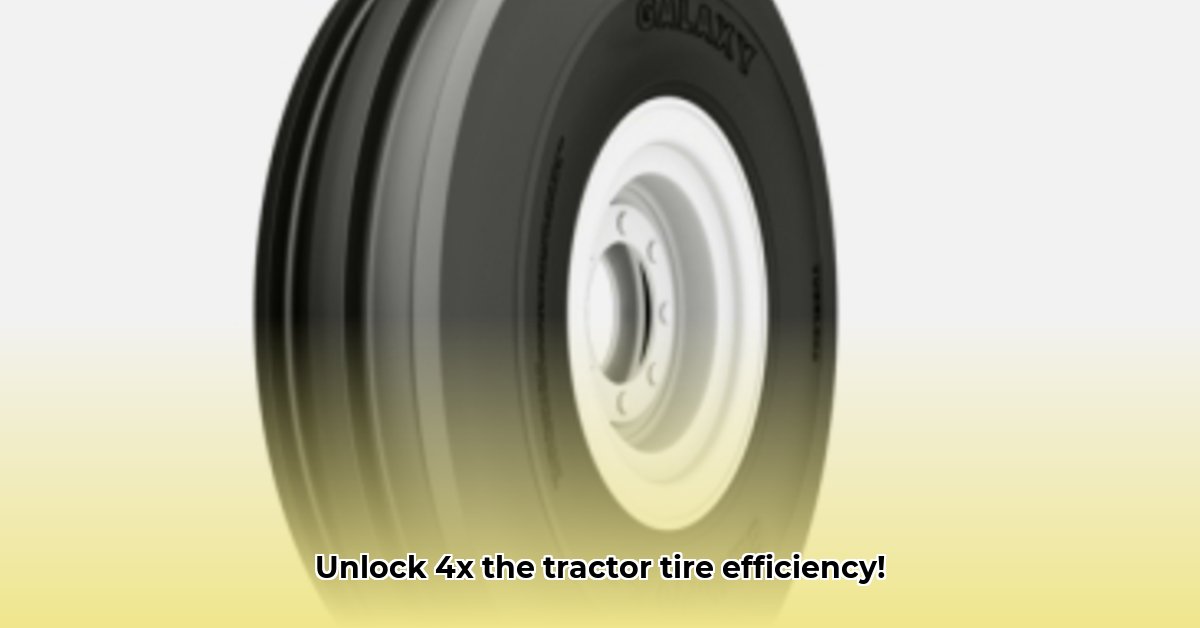
Understanding Your 4.00-19 Tire Needs
Selecting the right 4.00-19 tractor tire is crucial for both operational efficiency and environmental responsibility. This common size is used across a variety of applications, but the optimal choice depends heavily on your specific farming context. Consider these factors: soil type (heavy clay, sandy loam, etc.), typical farming operations (tilling, hauling, etc.), and the overall demands placed on your tires. A tire designed for superior traction in muddy conditions may not be ideal for hard-packed soil, and vice versa. Choosing poorly can lead to increased fuel consumption and soil compaction. Are you maximizing your tire's potential? For more information on tractor tire options, check out this helpful resource.
Key Factors for Sustainable 4x19 Tractor Tire Selection
Several key factors influence the sustainability of your 4.00-19 tractor tire choice. These go beyond simple cost considerations and encompass the tire's entire lifecycle.
Tread Pattern: Minimizing Soil Compaction
The tread pattern significantly impacts soil compaction. Deep, aggressive lugs provide superior traction in wet or muddy conditions but may increase compaction in drier, firmer soils. Conversely, shallower patterns minimize compaction on hard surfaces but may compromise traction in less favorable conditions. Research indicates that tires with self-cleaning treads reduce soil buildup, further minimizing compaction and maximizing efficiency. What tread pattern best suits your specific soil types and farming operations?
Tire Materials: A Focus on Sustainability
The materials used in tire production play a crucial role in environmental impact. While complete data on the specific composition of 4.00-19 tires remains limited, some manufacturers utilize recycled materials or sustainably sourced rubber in their production processes. Look for brands committed to transparency in their supply chains. Sustainability often correlates with higher durability – how can you utilize this connection to maximize your investment?
Durability & Lifespan: Reducing Waste and Replacement Costs
A longer-lasting tire translates to reduced waste, fewer replacements, and lower overall costs. Consider the tire's construction, materials, and any warranty offered by the manufacturer. A robust tire with reinforced sidewalls will likely withstand the rigours of farming better than a less durable option. How does maximizing tire lifespan affect your overall farming costs and environmental impact?
End-of-Life Management: Responsible Disposal Practices
The end-of-life management of your tires is equally crucial. Choose tires from companies with established recycling programs or those that partner with responsible recycling facilities. Proper disposal helps minimize landfill waste and promotes a circular economy. A considerable benefit of choosing durable tires is that you reduce the frequency of disposal. What responsible disposal options are available in your region?
Step-by-Step Guide: Choosing Your Sustainable 4.00-19 Tire
This comprehensive guide provides a structured approach to selecting sustainable 4.00-19 tractor tires:
Assess Your Farming Practices: Analyze your soil types, typical operations, and the demands placed on your tires. This crucial first step will shape your subsequent choices.
Research Tire Models: Investigate various tire models, focusing on features like self-cleaning treads, deep lug depths, reinforced sidewalls, and sustainability certifications (if available). The Deestone F-2 serves as a potential example; however, further research is necessary for a complete comparison.
Compare Sustainability Features: While comprehensive sustainability data remains limited, manufacturers are increasingly transparent about their sourcing and manufacturing processes. Seek out information on recycled materials, sustainable rubber, and end-of-life management. Manufacturers’ websites and direct contact can provide valuable insights.
Evaluate Total Cost of Ownership: Compare not only the initial purchase price but also the tire's projected lifespan, and fuel consumption (improved traction often equals better fuel efficiency). A more expensive, longer-lasting tire can offer superior value in the long run.
Prioritize Transparency: Choose manufacturers committed to transparent sustainability practices. Companies openly sharing their environmental impact are more likely to uphold their commitments.
Maintaining and Recycling 4.00-19 Tractor Tires
Proper maintenance extends tire lifespan and minimizes waste. Regularly check tire pressure (underinflation increases wear and tear), inspect for damage, and rotate tires to ensure even wear. When the tires reach the end of their life, utilize responsible recycling programs to reduce environmental impact.
Conclusion: The Path to Sustainable Farming Practices
The selection and maintenance of sustainable 4.00-19 tractor tires are essential components of environmentally responsible farming. While research continues to develop a more comprehensive framework for evaluating tire sustainability, the steps outlined above provide a solid foundation for informed decision-making. Remember that responsible tire selection is only one aspect of a broader commitment to sustainable agriculture. By combining this approach with other practices, you can build a more robust and sustainable farming operation.